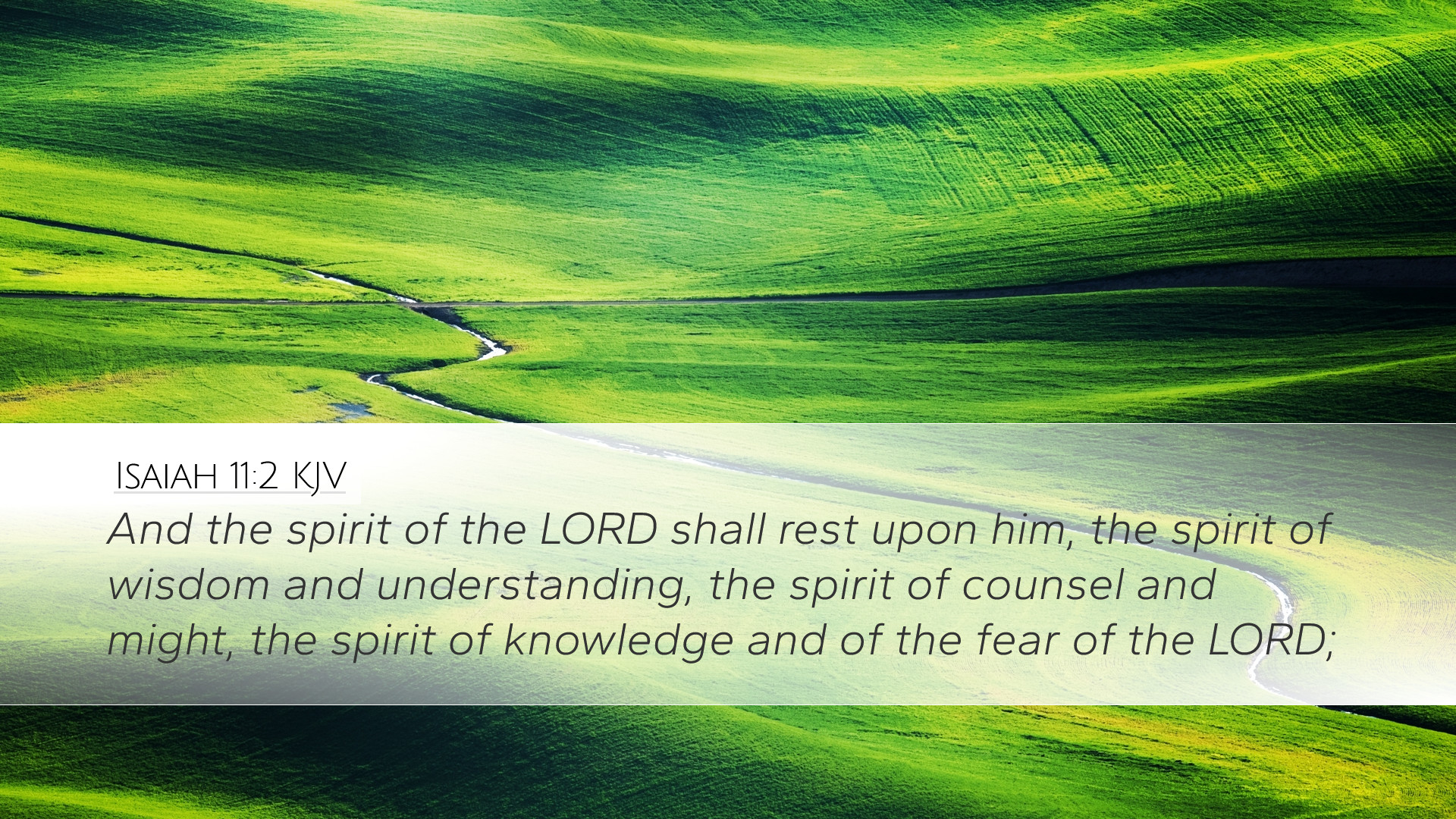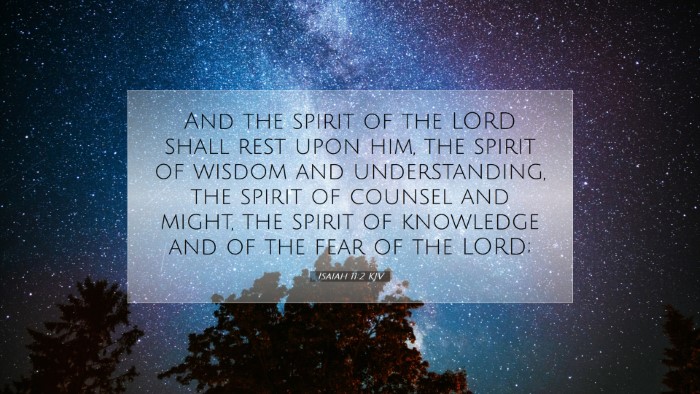Isaiah 11:2 - A Commentary
Verse: "And the spirit of the LORD shall rest upon him, the spirit of wisdom and understanding, the spirit of counsel and might, the spirit of knowledge and of the fear of the LORD."
Introduction
This verse from Isaiah elucidates the profound characteristics of the coming Messiah, emphasizing the divine endowment that He would possess. It is critical to examine the context, the meaning of the spirits mentioned, and the implications this has for our understanding of Christ’s ministry and the nature of God’s providence.
Contextual Background
Isaiah 11 is part of a broader prophetic vision concerning the restoration of Israel and the future reign of the Messiah from the lineage of Jesse, identified as David's father. The chapter paints a picture of a righteous leader who brings true justice and peace. Understanding the historical backdrop of Israel during Isaiah's time, including the Assyrian threat and spiritual decline, enhances our interpretation.
Commentary on the Spirit of the LORD
(Matthew Henry): The phrase "the spirit of the LORD" indicates the divine presence and power that would be upon the Messiah. It suggests that Jesus was not operating through mere human wisdom or capability, but that His actions were compelled by divine directive. This spirit is seen as essential for His role in governance and salvation.
(Albert Barnes): Barnes emphasizes that the anointing of the Spirit signifies equipping for ministry. Each of the attributes following this phrase unveils the comprehensive nature of the Spirit’s work in Christ. The mention of the Spirit resting upon Him connotes a sustained and permanent presence, essential for the tasks ahead including teaching, healing, and ruling.
(Adam Clarke): Clarke notes that the verse reflects a Messianic ideal, illustrating that the spirit's presence rests not just on outward appearances but encompasses the essence of who the Messiah is. The anointing depicts a divine preparation for the Messiah’s perfect ministry which would ultimately transform Israel and all nations.
The Spirits Described
- Spirit of Wisdom:
This denotes the ability to discern and apply knowledge effectively. Wisdom is the highest form of understanding that enables one to act rightly in complex situations.
- Spirit of Understanding:
This relates to the comprehension of divine truths and the ability to grasp the heart of God’s will. It suggests a profound insight into the mysteries of God’s plan for humanity.
- Spirit of Counsel:
This refers to the ability to give divine guidance. The Messiah, filled with this spirit, would offer advice that aligns with God's purposes.
- Spirit of Might:
This embodies strength and power, indicating that the Messiah would have the strength to enact justice and righteousness on behalf of God's people.
- Spirit of Knowledge:
This implies a deep, experiential knowledge of God and His ways. It highlights the Messiah’s intimate relationship with the Father and His understanding of God’s creation.
- Spirit of the Fear of the LORD:
This aspect reflects reverence and awe before the holiness of God. It signifies that the Messiah would embody a perfect respect for divine authority, which undergirds His righteousness and justice.
Theological Implications
The presence of these spirits in the Messiah carries profound implications for Christian theology. It points to the necessity of divine empowerment in fulfilling God’s redemptive purposes. Pastors and theologians can derive lessons regarding the significance of reliance upon the Holy Spirit in ministry today, recognizing that effective service stems from spiritual alignment with God's will.
Practical Applications
For modern readers, this verse serves as both a comfort and a challenge. It reassures believers of the divine attributes of Christ, fostering trust in His leadership and provision. Conversely, it invites a reflection on our own lives: Are we seeking wisdom, understanding, and reverence for God as we live out our faith?
Conclusion
Isaiah 11:2 is rich with meaning and significance. It not only prepares the hearts of those awaiting the Messiah but also continues to teach and guide Christians today. The dual nature of Christ being fully divine and fully human is illustrated through this verse, showing the divine empowerment necessary for His mission. As believers draw from these divine attributes, they are called to exhibit them in their own lives, leading to a more profound engagement with God and His creation.


